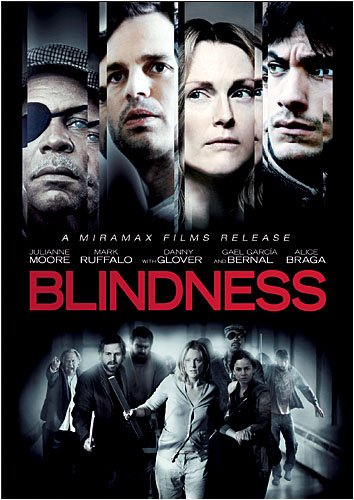
- TESTED
In this community of blind people there is still one set of functioning eyes: the doctor's wife has affected blindness in order to accompany her husband to the asylum. As the number of! victims grows and the asylum becomes overcrowded, systems beg! in to br eak down: toilets back up, food deliveries become sporadic; there is no medical treatment for the sick and no proper way to bury the dead. Inevitably, social conventions begin to crumble as well, with one group of blind inmates taking control of the dwindling food supply and using it to exploit the others. Through it all, the doctor's wife does her best to protect her little band of blind charges, eventually leading them out of the hospital and back into the horribly changed landscape of the city.
Blindness is in many ways a horrific novel, detailing as it does the total breakdown in society that follows upon this most unnatural disaster. Saramago takes his characters to the very edge of humanity and then pushes them over the precipice. His people learn to live in inexpressible filth, they commit acts of both unspeakable violence and amazing generosity that would have been unimaginable to them before the tragedy. The very structure of society itself alters to suit! the circumstances as once-civilized, urban dwellers become ragged nomads traveling by touch from building to building in search of food. The devil is in the details, and Saramago has imagined for us in all its devastation a hell where those who went blind in the streets can never find their homes again, where people are reduced to eating chickens raw and packs of dogs roam the excrement-covered sidewalks scavenging from corpses.
And yet in the midst of all this horror Saramago has written passages of unsurpassed beauty. Upon being told she is beautiful by three of her charges, women who have never seen her, "the doctor's wife is reduced to tears because of a personal pronoun, an adverb, a verb, an adjective, mere grammatical categories, mere labels, just like the two women, the others, indefinite pronouns, they too are crying, they embrace the woman of the whole sentence, three graces beneath the falling rain." In this one woman Saramago has created an enduring, full! y developed character who serves both as the eyes and ears of ! the read er and as the conscience of the race. And in Blindness he has written a profound, ultimately transcendent meditation on what it means to be human. --Alix WilberIn Blindness, a city is overcome by an epidemic of blindness that spares only one woman. She becomes a guide for a group of seven strangers and serves as the eyes and ears for the reader in this profound parable of loss and disorientation. We return to the city years later in Saramago’s Seeing, a satirical commentary on government in general and democracy in particular. Together here for the first time, this beautiful edition will be a welcome addition to the library of any Saramago fan.
Â
In this community of blind people there is still one set of functioning eyes: the doctor's wife has affected blindness in order to accompany her husband to the asylum. As the number of victims grows and the asylum becomes overcrowded, systems begin! to break down: toilets back up, food deliveries become sporadic; there is no medical treatment for the sick and no proper way to bury the dead. Inevitably, social conventions begin to crumble as well, with one group of blind inmates taking control of the dwindling food supply and using it to exploit the others. Through it all, the doctor's wife does her best to protect her little band of blind charges, eventually leading them out of the hospital and back into the horribly changed landscape of the city.
Blindness is in many ways a horrific novel, detailing as it does the total breakdown in society that follows upon this most unnatural disaster. Saramago takes his characters to the very edge of humanity and then pushes them over the precipice. His people learn to live in inexpressible filth, they commit acts of both unspeakable violence and amazing generosity that would have been unimaginable to them before the tragedy. The very structure of society itself alters ! to suit the circumstances as once-civilized, urban dwellers be! come rag ged nomads traveling by touch from building to building in search of food. The devil is in the details, and Saramago has imagined for us in all its devastation a hell where those who went blind in the streets can never find their homes again, where people are reduced to eating chickens raw and packs of dogs roam the excrement-covered sidewalks scavenging from corpses.
And yet in the midst of all this horror Saramago has written passages of unsurpassed beauty. Upon being told she is beautiful by three of her charges, women who have never seen her, "the doctor's wife is reduced to tears because of a personal pronoun, an adverb, a verb, an adjective, mere grammatical categories, mere labels, just like the two women, the others, indefinite pronouns, they too are crying, they embrace the woman of the whole sentence, three graces beneath the falling rain." In this one woman Saramago has created an enduring, fully developed character who serves both as the eyes and ears of th! e reader and as the conscience of the race. And in Blindness he has written a profound, ultimately transcendent meditation on what it means to be human. --Alix Wilber
Â


 10:16 AM
10:16 AM
 admin
admin

